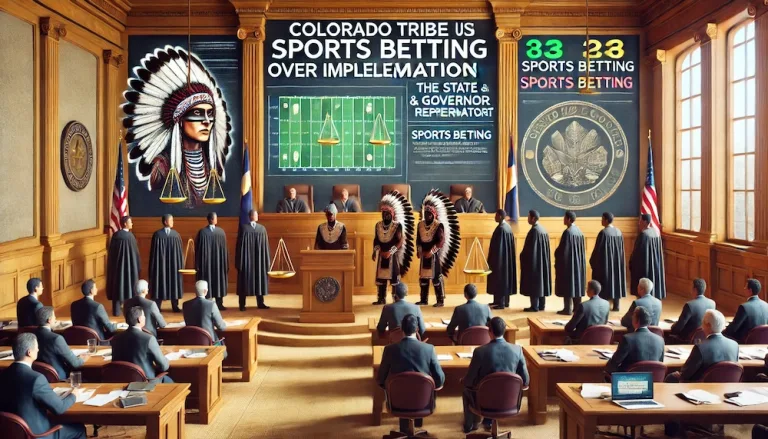Colorado Tribe Sues State and Governor Over Sports Betting Implementation
The Southern Ute Indian Tribe in Colorado has filed a federal lawsuit against Governor Jared Polis (D) and Colorado Gaming Division Director Christopher Schroder, accusing them of not negotiating in good faith as mandated by the Indian Gaming Regulatory Act (IGRA). The tribe claims that the state’s actions have excluded them from the burgeoning online sports betting market, thus depriving them of significant revenue opportunities.
Background and Allegations
Following Colorado voters’ approval of a sports betting referendum in November 2019, the Southern Ute Indian Tribe began strategizing its entry into the sports betting market. The tribe worked with the state to prepare for launching both retail and online sportsbooks. However, the Colorado Division of Gaming (CODOG) sent a letter to US Bookmaking, the tribe’s sportsbook partner, in June 2020, declaring that facilitating online bets on behalf of the tribe was illegal. This led to the suspension of the online Sky Ute Sportsbook and the eventual closure of the tribe’s retail sportsbook at Sky Ute Casino Resort in July 2023.
Financial Motivations
The lawsuit asserts that the state’s motivation was to ensure that it received tax revenue from sports betting operations. While Colorado’s licensed sportsbooks pay a 10% tax on their gross revenue to the state, the Southern Ute Indian Tribe argued that they are legally entitled to keep 100% of their online sportsbook income. Colorado’s gaming compacts with the tribes do not include revenue-sharing provisions, unlike many other states.
The lawsuit also notes that the Ute Mountain Ute Tribe faced similar actions, with their online sportsbook provider, IGT, shutting down operations following a similar letter from CODOG.
Attempts at Resolution
In October 2021, the Southern Ute Indian Tribe and Ute Mountain Ute Tribe participated in a “formal consultation” with the Colorado Commission of Indian Affairs. By this time, the online sports betting market in Colorado was well-established, making it difficult for the tribes to compete.
The tribe claims that this consultation was a mere formality, as the state had already secured a monopoly for non-tribal gaming enterprises. The state allowed the tribes to operate in-person sportsbooks but demanded a 10% tax on their online sportsbook revenue and insisted on regulatory oversight from CODOG.
Tribe’s Stance
The Southern Ute Indian Tribe argues that they have successfully operated their gaming activities for 30 years without incident and are fully capable of regulating their own businesses under tribal and federal laws. They see the state’s demands as unjustified and an infringement on their sovereignty.
Legal Precedent
The lawsuit references a recent U.S. Supreme Court decision regarding the Seminole Tribe in Florida, where it was ruled that online sports betting did not violate IGRA as long as the bets were accepted on tribal land. The Southern Ute Tribe believes that this ruling supports their case for operating an online sportsbook that accepts bets from personal devices located off-reservation.
Seeking Remedies
The Southern Ute Indian Tribe is asking the federal district court to:
- Declare their online sportsbook lawful.
- Instruct the state to stop violating the tribe’s gaming compact.
- Award financial damages.

Garry Sputnim is a seasoned journalist and storyteller with over a decade of experience in the trenches of global news. With a keen eye for uncovering stories that resonate, Alex has reported from over 30 countries, bringing light to untold narratives and the human faces behind the headlines. Specializing in investigative journalism, Garry has a knack for technology and social justice issues, weaving compelling narratives that bridge tech and humanity. Outside the newsroom, Garry is an avid rock climber and podcast host, exploring stories of resilience and innovation.


